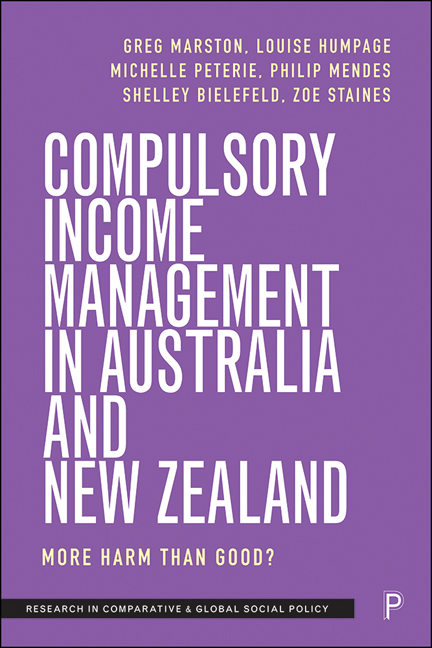Book contents
- Frontmatter
- Contents
- List of abbreviations
- About the authors
- Acknowledgements
- Series preface
- 1 Framing welfare conditionality
- 2 Why Income Management?
- 3 Barriers to implementing Compulsory Income Management
- 4 Identity and emotion
- 5 Procedural, consumer and contractual rights, and access to justice
- 6 Resistance and reform: individual and collective agency
- 7 Voluntary Income Management and financial education
- 8 Recalibrating social security and reimagining work
- References
- Index
5 - Procedural, consumer and contractual rights, and access to justice
Published online by Cambridge University Press: 08 October 2022
- Frontmatter
- Contents
- List of abbreviations
- About the authors
- Acknowledgements
- Series preface
- 1 Framing welfare conditionality
- 2 Why Income Management?
- 3 Barriers to implementing Compulsory Income Management
- 4 Identity and emotion
- 5 Procedural, consumer and contractual rights, and access to justice
- 6 Resistance and reform: individual and collective agency
- 7 Voluntary Income Management and financial education
- 8 Recalibrating social security and reimagining work
- References
- Index
Summary
Introduction
This chapter presents a sociolegal analysis of cashless welfare cards, considering the content of CIM laws and policies in Australia and New Zealand and how these are experienced in everyday life by cardholders. This study reveals a gap between official (idealised) narratives about how compulsory IM schemes function and about government income support recipient's everyday experiences. This reflects a long-held tradition in law and society scholarship of focusing on the distance ‘between the law-on-the-books … and the-law-in-action’ (Calavita, 2016, p 109). To make these gaps apparent, the legal framework governing IM programmes must be set out. Scholars working within critical social policy are also concerned with gaps between what is represented by policy frameworks and how this translates into people's lived experiences (Bacchi, 2009, pp xviii– xix).
The research for this book found that the autonomy of IM cardholders was adversely affected with respect to purchases of a range of everyday items that extended beyond those officially prohibited (Marston et al, 2020; Humpage et al, 2020a). Payment problems created by IM cards often caused people to be unable to acquire goods and services when these were needed, and rendered IM cardholders in Australia unable to pay a range of bills. As will be discussed in this chapter, this undermined long-valued consumer rights and contractual freedoms. This chapter also examines procedural rights for cardholders to exit or make complaints about IM schemes, and how these processes are experienced by those who have to use them.
This study shows that IM exit and exemption processes raise significant access to justice issues. For example, not only were there protracted timeframes for determining exit and exemption requests under the Australian CDC scheme, but cardholders also needed to acquire documentation from third parties at their own expense to submit their applications. The number of people who have been able to regain their autonomy through the legal frameworks governing IM exits and exemptions in Australia has been small (Australian Government, 2021c; 2021e). In New Zealand, exit from the Money Management programme typically occurs through participants aging out of the scheme, though IM has reportedly led some young people to withdraw from the social security system altogether or, tragically, take their own lives rather than be subject to the programme (Humpage et al, 2020a, p 13).
- Type
- Chapter
- Information
- Compulsory Income Management in Australia and New ZealandMore Harm than Good?, pp. 101 - 124Publisher: Bristol University PressPrint publication year: 2022



